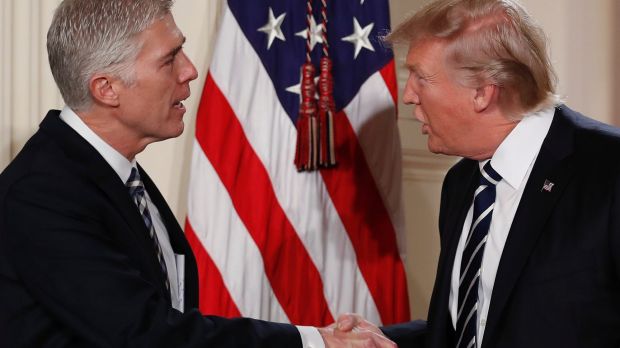Washington: With a lesser man in the White House, there might be a point to the Democrats filibustering Donald Trump's nomination of the youthful and conservative Neil Gorsuch to the US Supreme Court.
But this President doesn't mess about – he's told Republican senators that if the Democrats go to the trenches, then they must go for what the political cognoscenti call the "nuclear option".
More World News Videos
Shades of Scalia in SCOTUS pick Gorsuch
Donald Trump nominates Neil Gorsuch for the US Supreme Court, picking the federal appeals court judge to restore the court's conservative majority and help shape rulings on divisive issues such as abortion, gun control, the death penalty and religious rights.
Many Democrats are set for a brawl, embittered as much by Trump's election win as by the GOP's calculated gamble last year in stonewalling then President Barack Obama's nominee to replace the late Justice Antonin Scalia.
The chance for Trump to make this appointment was a huge incentive for conservatives, and evangelical voters in particular, to back his unorthodox candidacy. That's because everything in America is legal – and the Supreme Court is the final arbiter.
Gorsuch's appointment, if or when confirmed by the Senate, would not alter the recent make-up of the full court, which has been split 4-4 between conservative and more progressive justices since Scalia's death.
But it restores the 5-4 balance of Scalia's day, which was generally conservative – though because 80-year-old Justice Anthony Kennedy has a record of voting with both sides, he's often referred to as the court's swing vote.
And given the ages of some now on the bench, it's conceivable Trump might get to make another one, even two appointments in the coming four years which would lock-in a conservative majority for decades to come – a boon for this and future GOP administrations and a shackle for future Democrat presidents.
In this vein, Gorsuch's conservative legal credentials are as important as his age for what is a lifetime appointment – at age 49 he would be the youngest appointee in a quarter century and could be expected to serve for 30 or more years.

So what can the Democrats do? Under existing senate rules, a judicial confirmation requires 60 votes, and with just 52 senators the Republicans ordinarily would have to pressure or cajole eight Democrats to endorse Gorsuch.
So much is at stake that battles over judicial nominations invariably are described as epic.

But in a week in which Trump sacked the acting attorney-general, Democrats resorted to boycotting Senate confirmation hearings to stall the completion of Trump's cabinet appointments, anti-Trump protests flared across the country and about 1000 State Department officers who spoke out on Trump's migration crackdown were bluntly told they could go, "epic" doesn't make the cut to describe the political battlefield that is today's Washington – Democrats are itching for a fight, tempers are on a hair-trigger and some are getting very emotional.
The Democrats can filibuster – but only up to a point. Though the Senate rules say the Republicans need 60 votes to get Gorsuch over the line, they need only 50 to enact the "nuclear option" – that's to change the rules to require just 50 votes to appoint Gorsuch.

And the Democrats can't really complain – they went nuclear, changing the rules to end Republican intransigence on a wave of Obama appointments to agencies and the judiciary.
But the Republicans have another potent political ace up their sleeves – at next year's midterm elections, five or more of the Democrats will be facing the people in states that voted for Trump. Block Gorsuch, they are being gleefully warned, and the GOP will have a stick with which to beat them during their campaigns.

Democrats are dithering. Angry in defeat, their progressive base is demanding that they lash out – but Democratic senators are in several minds, eager to avenge the Republican humiliation of Obama in denying his constitutional right to appoint a judge last year, but wary of goading the GOP by opting for political theatre that will not change the outcome.
The call that Democrat Senate leader Chuck Schumer is trying to make is to let the confirmation process proceed or, as the Republicans did when Obama nominated Merrick Garland, to stonewall from the get-go.
"There's no doubt what they did [on Garland] was wrong and unconstitutional. In the end, I don't think we should play their game. Have a hearing and vote," said Jon Tester, a senator from Montana who is one of the Democrats at risk in the midterm elections.
But then there's this from Ohio Senator Sherrod Brown: "[GOP Senate leader] Mitch McConnell stole a Supreme Court seat from the US and if Trump wanted to bring the country together … he would nominate Merrick Garland and say he's middle of the road."
So why all the fuss - why is such a seemingly simply rule change likened to a nuclear detonation? Well, because this is not how the Senate is supposed to conduct itself.
As The Washington Post describes it: "It would be about forever changing the nature of the Senate, which the founders set up with the express goal to slow down and cool off the hasty and heated impulses more common in the House".
That arrangement gives senators enormous and at times, it must be said, absurd power over the administration. But senators historically have been jealous of their power to go off into the weeds, as they see fit.
The theory behind the filibuster is that it forces considered debate in which the majority party is required to compromise as needed to get members of the other party to support their position, thereby achieving laws that are more stable because they are based on bipartisan support – like the groundbreaking 1964 Civil Rights Act, which got through on the votes of 27 Republicans and 44 Democrats in the face of a filibuster by Southern senators.
So even as it inches into a cataclysmic battle on the Gorsuch appointment, individual senators on both sides are walking away from their party colleagues.
Joe Manchin, a Democrat from West Virginia, a state Trump won by 42 points, doesn't even bother with the pretense of wanting to stall the Gorsuch appointment – a strong believer in executive authority, he told reporters: "I'm not a filibuster-type guy".
And on Monday, Susan Collins, a Republican senator from Maine, told reporters: "I am not a proponent of changing the rules of the Senate – I hope that common sense will prevail and that we will have a normal process for considering this nominee."
White House insiders are letting it be known that another element in the selection of Gorsuch was his service as a young lawyer as a clerk to the swinging vote judge Kennedy.
Amidst speculation that Kennedy might be reluctant to retire lest the bench be stacked with hard-right conservatives, the Trump calculus was that appointing Gorsuch would be a message to Kennedy that he could go quietly into the night, in the knowledge that someone he knows is on board – thereby giving Trump another vacancy to fill.
Ironically, Gorsuch was a classmate of Obama's at Harvard Law School. But he's conservative – his decisions have backed the right of employers who, for religious reasons, objected to laws requiring the inclusion of contraception in workplace health insurance schemes and he has rebuked liberals for going to the courts, not the legislature, to settle policy issues.
Especially dear to Republican hearts and minds is Gorsuch's reputation as an "originalist" – that's a judicial school whose interpretation of the Constitution by what is reckoned to be the understanding of those who drafted it centuries ago, favours conservative law-making.


















27 comments
New User? Sign up